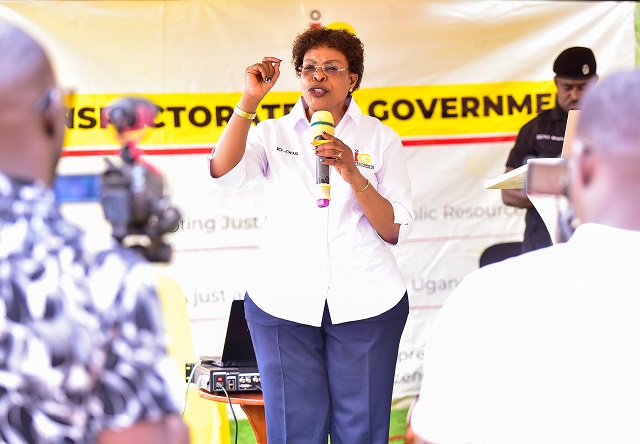
Kampala, Uganda | THE INDEPENDENT | Junior civil servants have told the IGG Beti Olive Namisango Kamya-Turomwe that they are reluctant to report cases of corruption due to dependence on tokens received from their superiors.
In the ongoing campaign to tackle corruption within government institutions, the IGG, during a meeting held at the Office of the Prime Minister in Kampala on Wednesday urged civil servants to avail information regarding corrupt practices.
However, during the interaction, several junior civil servants conveyed their dilemma to the IGG, emphasizing their dependence on tokens or minor favors from their superiors to complement their meager incomes.
“As a secretary, I receive 220,000 Shillings per month, and many times we go months before receiving this money. Now, if the boss offers a significant sum from a questionable deal, I know it’s illegal, but I choose to turn a blind eye and accept whatever is given to me in peace because the government has failed to address our pleas for salary enhancement,” the junior support staff noted.
Her statement was met with applause, indicating that her sentiments resonated with the majority in the room. Another civil servant shared her experience of struggling to afford transportation to the office and school fees for her children on the meager salary provided.
She candidly said that when faced with financial hardships, receiving a large sum of 2 million shillings, for example, from a superior is accepted with gratitude and warmth. She emphasized further, illustrating how valuable these tokens are in her life.
She explained that she can even go as far as tithing from it, viewing it as a divine blessing. She firmly declared that there was no way she could report a corrupt senior officer who had offered a token from these dealings.
Many staff members acknowledged that they possess significant information they could share with the IGG. A driver mentioned that they often transport senior officials to various locations where they engage in investigating looted money, and in some cases, they even assist in collecting ill-gotten gains.
Secretaries assistants, and bodyguards echoed similar sentiments, highlighting instances where money is deposited into their accounts on behalf of their bosses, leaving them conflicted about how to resist or what grounds to base their complaints on.
Throughout the discussion, many participants, whose names have been withheld as they shared their thoughts in confidence with the IGG, frankly expressed to the IGG that they may not be willing to report their bosses due to the prevalence of corruption in many of these situations.
Before the civil servants disclosed their predicament, Kamya addressed low-level staff from various ministries, departments, and agencies.
“You, the secretaries, drivers, and other support staff in the public service, are privy to what is happening. Provide us with this information to catch the big fish,” Kamya urged.
She highlighted instances where corruption funds have been traced back to low-level staffers who were unwittingly used by their superiors to sign documents, sometimes without their knowledge, in exchange for small tokens. When the Inspectorate of Government intervenes, it is often these junior staff members who face the consequences.
“In many cases, they (implicated junior staff) admit to signing the documents on behalf of their bosses. However, verbal confessions are not enough to hold the higher-ups accountable, leaving the junior staff, such as secretaries, to bear the brunt of the consequences. They have been manipulated, and when the situation becomes difficult, they are abandoned. Why wait until you find yourself in trouble? Report them before it’s too late,” Kamya added.
Kamya acknowledged that the issue of salary enhancement in the fight against graft has been addressed and assured them that they would once again bring the matter to the attention of the head of state.
However, Kamya added that while receiving tokens from graft may seem like a temporary solution to their current problems, in the long run, they could become victims of corruption as government systems fail to function properly.
Kamya said that the absence of corruption could support initiatives such as free healthcare and education, which could benefit not only the staffers themselves but also their relatives. She emphasized that the simple token they receive cannot help them access better private social services, whereas these services could be available or affordable in public spaces if there was no graft.
A report by the IGG indicated that Uganda is losing close to 10 trillion shillings to corruption annually. In the last financial year, URA collected 20 billion, suggesting that half of it was swindled. Most of these funds are primarily stolen by public officers, who number just about 380,000, amidst a population of over 45 million Ugandans.
Kamya asserts that if this money is not stolen, its impact would be substantial. To illustrate the matter, she pointed out that if you divide it among the parishes of Uganda, each parish could receive 1 billion shillings annually. She then invited the low cadre to imagine what one billion could achieve if allocated to a parish every financial year for five years.
As an incentive to reporting, the IGG reminded the junior staffers that there is an opportunity to receive a percentage of the recovered funds if a secretary reports to their officers.
“In many government departments and agencies, money is stolen in billions. However, the law stipulates that if you report to us, we can give you 5 percent of the recovered funds. If it is a billion, you earn 50 million shillings. I believe this is a better option. In many cases, we hear that you are given just 2 million or even less,” the IGG noted.
The IGG also urged lower staff to cease being used to sign on behalf of their bosses or to draft loose minutes without clear direction, advising them to request their bosses to put their orders in writing.
“We are aware that bosses often use you, and many times, there is no clear evidence to present. We are in talks with the head of civil servants. We want all directives and requests made in the office to be put into writing and to do away with verbal communications,” she added.
Meanwhile, during the meeting, the IGG also emphasized that low-level staffers should utilize the services of IGG officers across the country to report other grievances such as maladministration, victimization, discrimination, and non-payments inflicted by higher-ranking officials affecting the lower-level staffers so that they can seek redress. However, it was noted that this avenue should not be abused to maliciously target individuals.
The Wednesday meeting marked the first-ever engagement between the IGG and the support staff. Following the meeting, the staffers requested another such engagement to voice their other concerns.
Since last year, the IGG has changed its strategy in fighting graft from waiting for reports to be filed and then investigating to involving the general public and all officers in the fight. Last year, they held meetings and conducted educational sessions with locals in different areas. This year, they initiated the initiative by meeting top accounting officers, middle-level civil servants, and now junior staffers.
***
URN
 The Independent Uganda: You get the Truth we Pay the Price
The Independent Uganda: You get the Truth we Pay the Price


